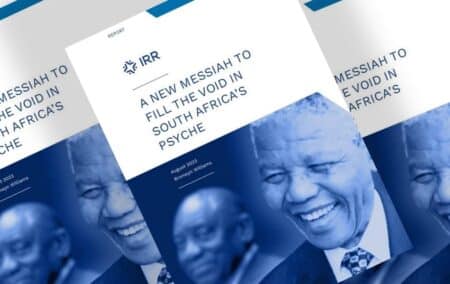South Africans desire to be led to a better future, but no leader at present has shown the ability to step into this role.
This is the key message of A New Messiah to Fill the Void in South Africa’s Psyche, a new report authored by renowned futurist and analyst Bronwyn Williams, and published by the Institute of Race Relations (IRR).
The country Africa has ‘a Mandela-shaped hole’ in its psyche, and something will fill it, the IRR says in a statement. However, whether what emerges to fill this hole will be good or bad is uncertain.
‘Dealing with the thorny issues of how South Africa is navigating (or failing to navigate) its present crisis, the report describes how South Africans have often reverted to hope that a messiah – a charismatic leader – will stride forth and lead them to redemption. This was most visibly shown in Nelson Mandela, and the inspiration and adoration that he inspired.’
Williams goes on to describe how similar pulls of charismatic leadership produced the ascendency of Jacob Zuma. She writes: ‘A Mandela-shaped hole in the South African psyche led the voting population to choose a big man, an undoubtedly charismatic, albeit not benign leader, over a career politician with credentials but lacking in magnetism.’
‘The consequences of this have been painfully evident.’
The report discusses how disenchantment with democracy, the rise of populism, the impact of the Covid pandemic and the large, frustrated youth cohort add additional impetus to these impulses. South Africans desire to be led to a better future, but no leader at present has shown the ability to step into this role.
‘Ultimately, Williams contends that it is likely that a messiah figure will arise in time.’
She sketches various possible scenarios to set out how this could play out. An ‘Absent Messiah’ would see the current drift continuing, with no figure able to capture the imagination of a critical mass of the country’s people. A ‘False Prophet’ would see the role taken up by a fraud, and after a burst or initial enthusiasm (or panic), South Africa returns to its malaise. A ‘Second Coming’ would entail the emergence of a principled, innovative leader who could inspire the best in the country, and head a movement for its salvation. An ‘AntiChrist’ is the nightmare option where a charismatic leader pushes the country into internal conflict and destructive policy to the eventual ruin of all.
She writes: ‘The populist hole in the South African soul will be filled, either by another messiah in the mould of Nelson Mandela, Chris Hani and Desmond Tutu, that South Africa has been fortunate enough to attract in the past, or — more likely — in the form of an antichrist-like figure, the likes of which fellow African nations are all too familiar with, a more dangerous candidate with aspirations more akin to those of Muammar Gaddafi, Idi Amin, Robert Mugabe, and Théoneste Bagosora.’
The report concludes with a succinct summation of what eludes South Africa in its existing political culture: ‘What is really missing is a clear, assertive visionary — a charismatic leader ready to step up and fill the power vacuum with agency and hope — with the blessing of the people.’


